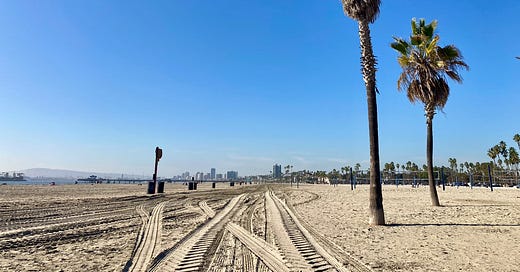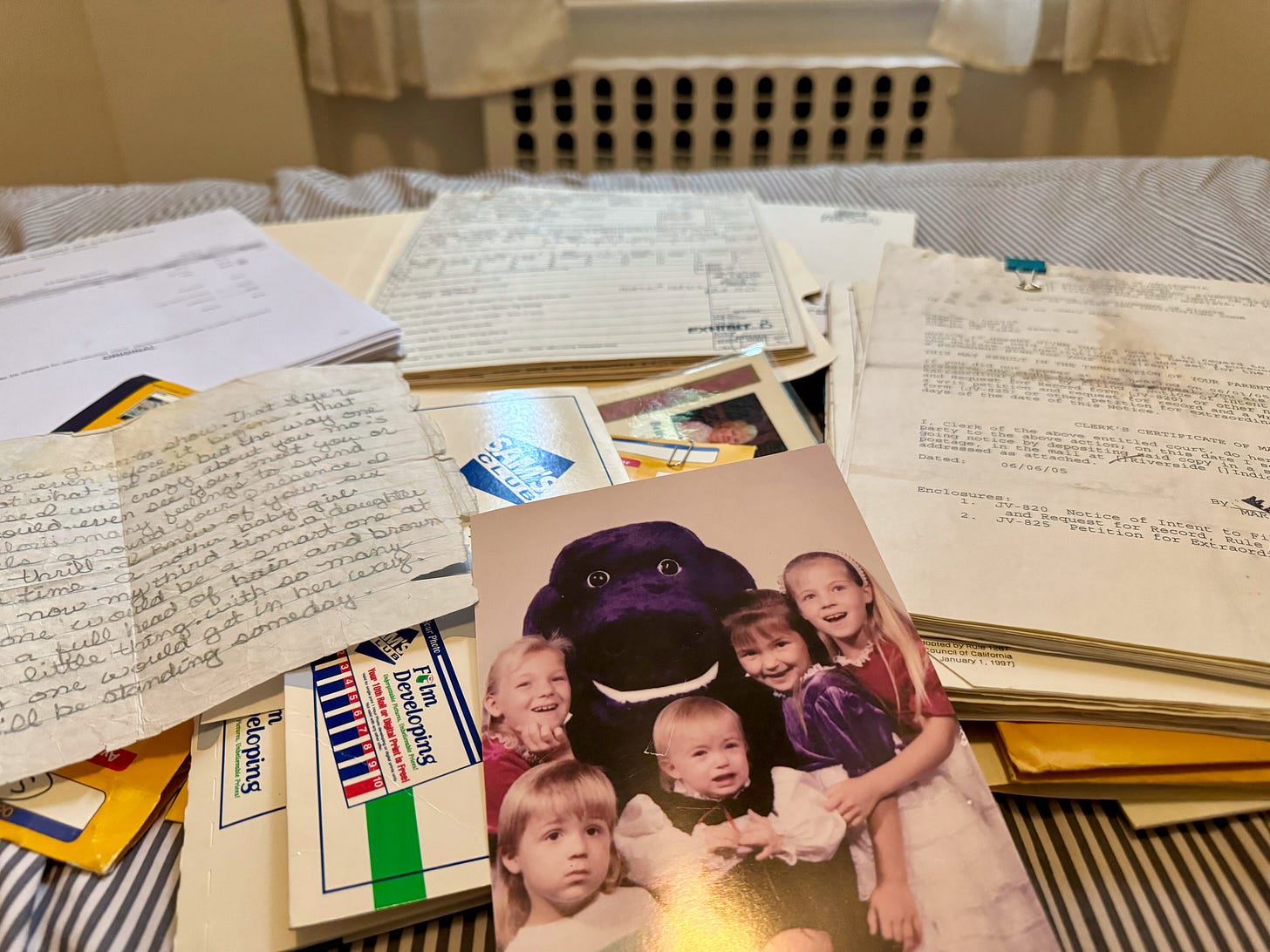Memoir Musings: My Plea for You to Start Conducting Family Research for Your Memoir
…and how exactly I did it.
Important Announcements:
The next virtual write-in will take place tomorrow morning (Tuesday, July 23) at 10:00 AM (EST). If you haven’t already, upgrade to a monthly paid subscription to join and wait for the Zoom link to appear your inbox!
The next Must Love Memoir reading event takes place on Tuesday, August 13 at 7:30 PM — Location: The Oak Cellar Room at Jake’s Dilemma (430 Amsterdam Ave)
In January of 2023, just a few weeks before I began my thesis semester for my MFA program, I took a trip home to Southern California. It was for the sole purpose of compiling as much family research as possible for the memoir I had been working on for years.
Before that, I’d never really considered how research could play a part in memoir. Didn’t I have all the information I needed to construct my own story? I thought I did. Also, I hadn’t planned to write about my parent’s or my early childhood in too much detail.
The more I started studying the process of writing (and the more I went to therapy), the more I understood that there were so many things hidden in those early years that had always remained so blurry. Things I’d need to unpack and confront to know what I could possibly offer a reader.
I read some memoirs that dealt with personal research head on—books like The Night of the Gun, Blood, Negative Space, and After the Eclipse. All of them inspired and forced me into realizing that I needed to look for information beyond just my own memories.
Maybe you’re thinking, duh. Or maybe you’re so close with the people in your life that you really do already know it all. But if you’re anything like me, with an estranged family and/or a lot of deceased relatives, you might be wary of what information is out there for you to find.
In an early draft of an essay I submitted to an MFA workshop, I wrote the line, “The side effects of a hand-me-down nomadic lifestyle, sprinkled with just enough poverty, means I’ll never find any trace of breadcrumbs or anything that would have led me to know the person my dad was just a little bit better.”
We can all collectively agree that that’s a terrible, wordy, and very clunky sentence, but it showed something I fully believed when I first began seriously working on my memoir: I didn’t have a chance in hell of finding any information I didn’t already have. I assumed any tangible evidence was long gone or forgotten. But the thing is, I’d never actually asked anyone—and how was I going to know for sure if I didn’t even try?
It took me almost a year of graduate school to realize I was really just afraid of what I’d find. That’s when I decided to take inspiration from the memoirs I was reading and follow in the footsteps of some of my favorite authors. So I started asking questions and became overwhelmed with what information was out there for me to find.
So consider this a plea to do some family research while writing your memoir, and you can use the steps I took as inspiration if you’d like.
One.
I began my family research with public records. I wasn’t quite ready to bring any family members into the process or let them know what I was working on, so I started with what I could do myself. Public records seemed like the obvious place to start. Since my dad had died in a car accident, I decided to write a letter to the Riverside County Sheriff’s office for any information they had about the accident.
I looked up arrest records, court documents, or anything else I could think of regarding my parents and grandparents. Not all inquiries led to something groundbreaking. I did receive a thick envelope in the mail from the Riverside Sheriff’s office roughly two months after I mailed my request letter with the full coroner’s report. I also accessed a few online databases for court documents.
Two.
The next thing I did was look through old Facebook posts and photos. Since I hadn’t held onto much when I left my childhood home abruptly (packing only what would fit into my compact car), I’d left my journals behind. Because of that, I didn’t have access to my early childhood and adolescent thoughts—something that still upsets me.
I was, however, able to look back at my early 20s life splattered all over social media and pull dates and locations from there. It helped with a very specific part of my memoir that deals with dropping everything to move to New York City.
Three.
I got as far as I could on my own and then made a phone call to my mom, who I had never been super close with. I let her know what I was doing (writing a memoir) and what I was looking for (anything at all that would help me make sense of the childhood I barely remembered).
I started by asking big questions—how she and my dad met, what their early relationship was like, and what the very early years of my childhood were like. All questions I’d never asked her before. I didn’t have a ton of solid memories before I was seven, so this proved to be one of the most valuable things I could do.
A series of conversations started, and the big questions eventually led to smaller, more detailed questions that helped my mother and I start to repair our damaged relationship. I repeated this step with my sisters. I took a lot of notes and recorded the phone calls whenever possible to get as much accuracy in my writing as possible.
Speaking to my mom and sisters led to a lot of new discoveries. I found out about a video my dad recorded for my siblings and me when I was about 7 and he wasn’t in our lives. My sister also sent me a bunch of photos and some letters my dad had written to my grandma and one he wrote to my mother around the same time he recorded the video.

Four.
The next thing I did was book my ticket to Southern California for my official family research trip. There, I went through everything my mother and her mother had managed to hold onto. There was so much more than I ever imagined there would be. We rummaged through filing cabinets, plastic bins, and endless scrapbooks. There were school papers, apartment leases, birth announcements and certificates, and a hand-written police report from when I was just three months old.
My mother and I drove to several government buildings trying (in vain) to track down very old CPS records, and I took a solo drive to the Orange County courthouse, leaving with a copy of every document filed from a custody battle after my dad died. The goal was to get my hands on every tangible piece of information I could access, so I could bring it home and have as many facts as possible to help anchor my writing in the truth.
Five.
The last thing I did was email as many distant relatives as I could who had been around during my childhood. I asked them for any information they could give me about my parents or me and my siblings.
This was the biggest dead end for me since my parents had been relatively isolated from their family members when they were together. But I felt it was still good to try and it gave me the opportunity to connect with distant aunts and uncles that I hadn’t spoken to in years. It also gave me valuable context into the insular nature of my family life when things were at their most volatile.
After everything I did, I can tell you I was left with a lot of new discoveries, uncomfortable revelations, and a bunch more traumatic information to process in therapy. I can also tell you that it dramatically shifted what I thought my memoir was about—something that was incredibly daunting at first but now feels like a right of passage in a weird way.
I sought out to tell a particular story and, as memoirists often do, found out it demanded to be about something else. I am still working through what that something else looks like. But I do know that all that time spent researching was worth it to help me be as truthful as possible in my writing.
I hope this post was helpful or inspiring in some small (or maybe even big) way. I am also always open to questions about how to go about starting your research or what kind of research you should be doing. Share your thoughts in the comments or send me a message!
And don’t forget to join me tomorrow for another virtual write in 🩷
Until next time,
Krystal









